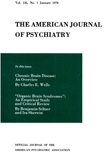Beyond diagnosis: the phenomenology of schizophrenia
Abstract
The authors believe that sharp distinctions of schizophrenia based on cross-sectional signs and symptoms provide the basis for precise and reliable diagnoses, but they do not believe that diagnoses derived from a narrow descriptive base are generously informative on the broad range of human functioning vulnerable to impairment in the course of schizophrenic illness. They comment on the 12-point flexible diagnostic system, illustrating the strengths and weaknesses of well-defined but narrow models for diagnosis, and on the results of testing the predictive validity of several diagnostic approaches. Finally, they contrast the phenomenologic approaches to schizophrenic illness with modern-day descriptive psychiatry, noting implications for clinical practice.
Access content
To read the fulltext, please use one of the options below to sign in or purchase access.- Personal login
- Institutional Login
- Sign in via OpenAthens
- Register for access
-
Please login/register if you wish to pair your device and check access availability.
Not a subscriber?
PsychiatryOnline subscription options offer access to the DSM-5 library, books, journals, CME, and patient resources. This all-in-one virtual library provides psychiatrists and mental health professionals with key resources for diagnosis, treatment, research, and professional development.
Need more help? PsychiatryOnline Customer Service may be reached by emailing [email protected] or by calling 800-368-5777 (in the U.S.) or 703-907-7322 (outside the U.S.).



